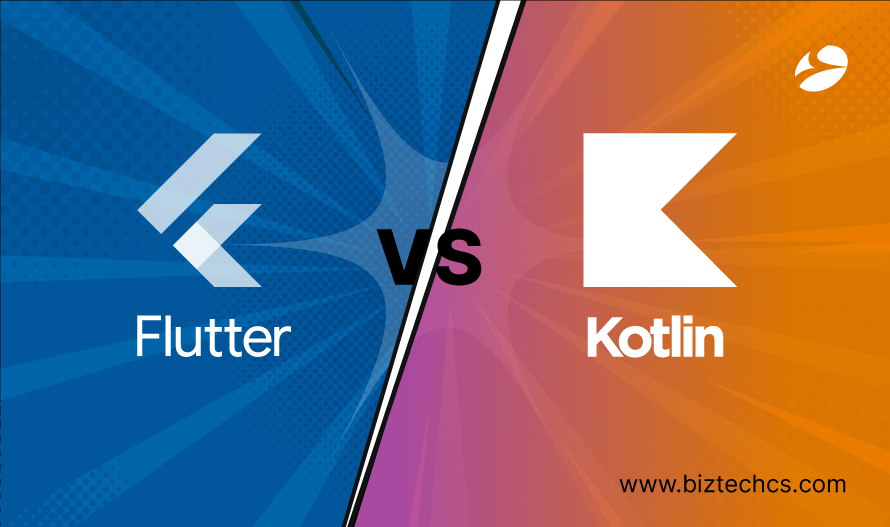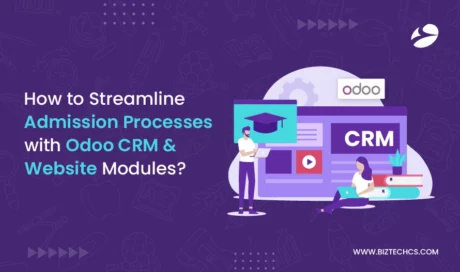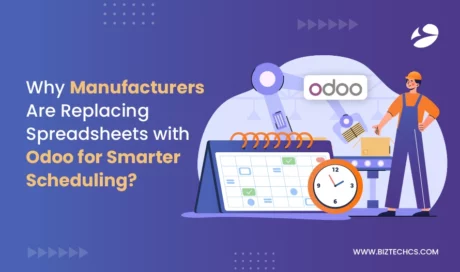4109
Flutter Vs Kotlin: Which One Should You Choose in 2024?
15 May, 2024
7 min read
4109
15 May, 2024
7 min read
Table of content

As mobile apps have become indispensable parts of our everyday lives, every business has found an attractive market in the form of mobile app development. Likewise, the technologies to develop these mobile apps are huge too.
Today, we will talk and compare two such technologies – Flutter vs Kotlin to see which one reigns supreme in 2024. Backed by Google, Flutter is a cross-platform SDK (software development kit) that helps develop high-quality mobile apps.
Kotlin, on the other hand, is also supported by Google and was primarily used for native Android development. However, the new Kotlin multiplatform is used to develop multi-platform applications.
Let’s check in detail about the two technologies!
Developed by: Google and Community
Initial Release: May 2017
Programming Language: Dart, C, C++
The open-source SDK (software development kit), Flutter is used for developing cross-platform mobile applications. With support for multiple platforms such as Android, iOS, Mac, Windows, Linux, Fuchsia, and the web, Flutter is one of the most popular SDKs.
In fact, in the cross-platform category, it has become the most popular mobile framework amongst developers in 2022, surpassing frameworks such as React Native, Cordova, and Ionic, as per Statista.
Advantages:
Challenges:
Developed by: JetBrains
Initial Release: July 2011
Paradigm: Object-Oriented, Multi-Paradigm
Kotlin is a general-purpose, high-level programming language that interoperates completely with Java, while also fixing some of the common drawbacks of Java, such as verbosity and null pointer exceptions. It was adopted by Google in May 2019 as the preferred language for developing Android applications.
In 2017, Kotlin multiplatform was released and is now used for developing server-side applications, web frontend, desktop apps, data science, cross-platform development, and scripting and automation in addition to Android development.
Advantages:
Challenges:
1. Language and Environment
Kotlin is a statically typed programming language that runs on JVM (Java Virtual Machine) and is interoperable with Java. It is used primarily for developing Android applications. However, you can use Kotlin multiplatform to develop apps for multiple operating systems such as Android, iOS, MacOS, Linux, Windows, and others.
While Kotlin is a programming language, Flutter is an SDK with a rich set of pre-designed widgets developed using Dart programming language. The widget-based framework extends advanced features like hot reloading to make development more efficient.
2. Platform Support
While Kotlin is preferred for Android development, Kotlin Multiplatform can be used for multiple platforms including iOS, Android, Web, and desktop, though support for platforms other than Android is less mature.
The Google-backed Flutter is a cross-platform SDK that helps build apps for iOS, Android, web, and desktop from a single codebase. Although its support for desktop and web is quite functional, it is still evolving.
3. Performance
When comparing Kotlin vs Flutter for Android development in terms of performance, Kotlin is known for its excellence in Android development. It compiles the code to bytecode or machine code, thereby improving the app performance. However, the performance may vary depending on specific use cases.
Flutter, however, compiles the codes into ARM code for iOS and Android development both and is considered very good to build most kind of applications.
Not that Flutter and Kotlin Multiplatform both lack in providing excellent performance for desktop and web applications as these aren’t matured yet and still evolving.
4. UI Development
When comparing Kotlin multiplatform vs Flutter, note that Kotlin uses native platform UI components. Thus, achieving native app-like look and feel becomes easier regardless of the operating system you are developing for.
But in Flutter SDK, the Flutter engine draws a rich set of widgets that mimic the look and feel of native component. The UI will give you a native-like feel but not quite there. If you wish to attain platform-specific look with Flutter, you have to put more effort or hire Flutter app developers to get the job done neatly.
5. Developer Productivity and Tooling
You can build powerful mobile applications in Kotlin by integrating with Android Studio and IntelliJ IDEA. It gives you access to advanced features like code completion and advanced debugging and refactoring tools that makes development easier, faster, and smooth for you.
Flutter also lets you use tools like Android Studio and Visual Studio Code that leverages Flutter’s hot reloading capability and enables you to code applications faster and seamlessly. You can further build real-time functionalities smoothly with the help of Flutter Websockets.
6. Learning Curve
If you come from a Java background, working with Kotlin will not be much of a challenge as its concise syntax is similar. Thus, developers having familiarity with modern development concepts will not find it difficult. However, if you are not well-versed in Java, the learning curve would be steeper.
To be able to work with Flutter, you will have to learn to work with Dart programming language, which is not as popular as Java. But, it is quite easy to learn and anyone with fundamental programming skills can easily learn the language and work with Flutter.
7. Community and Ecosystem
Flutter – 162k GitHub stars
Kotlin – 47.6k GitHub stars
While Kotlin and Flutter both are some of the most popular choices for developing applications, each have a dedicated community of developers and followers. While Kotlin multiplatform is still evolving, Kotlin is adopted and used wholeheartedly for the development of Android applications. Besides, it is supported by Jetbrains and Google, ensuring it is upgraded and maintained in due time.
Developed and maintained by Google, Flutter has seen increasing popularity amongst its followers. It has a large number of packages and a wealth of resources that makes it a highly reliable technology for cross-platform development. Besides, you can easily find and hire Flutter app developers for your project as they are readily available.
As seen in the Flutter vs Kotlin multiplatform comparison, both technologies have their fair share of advantages and limitations. Thus, it depends on your requirements which one wil suit your needs better. Do you wish to develop an MVP? A UI-driven application? Or cross-platform apps? Then, Flutter might be the best choice for you. It is also feasible when you have budget constraints and need consistent behavior across platforms.
Whereas, Kotlin is a better fit for developing Android applications, multiplatform projects, large or complex applications, and apps with native performance needs. Besides, if you have a skilled Java team or want to leverage of JVM, Kotlin is definitely the better choice for you.
So, gauge your requirements and pick the best one depending on your needs. And if you need development assitsance for either of the two technologies, team BiztechCS is here at every step. Now, hire dedicated Kotlin developers and Flutter developers from BiztechCS and leverage our technical expertise to build the best application you have envisioned.
Connect with our Flutter or Kotlin developers for further assistance!
It’s unlikely that Kotlin Multiplatform will replace Flutter outright, as each serves distinct purposes and excels in different scenarios. Kotlin Multiplatform is primarily focused on sharing business logic across platforms while allowing for native UI development, which is especially beneficial for applications that require native look and feel or extensive use of platform-specific APIs.
Flutter, on the other hand, is designed for developers who want a fast way to build beautiful, natively compiled applications for mobile, web, and desktop from a single codebase. It’s particularly strong in scenarios where a unified user interface and user experience across platforms are crucial.
Both Flutter and Kotlin are in high demand, but for different reasons and in different contexts. Flutter is particularly popular among developers looking to create cross-platform applications efficiently with a single codebase. Kotlin, on the other hand, is in demand primarily among Android developers due to its official support by Google and its interoperability with Java.
Determining which technology is more budget-friendly between Kotlin and Flutter depends largely on the scope of the project and the target platforms. However, Flutter is considered more budget-friendly as it can share UI and business logic across platforms and significantly reduce development time and costs.
While it typically depends upon the project requirements, Flutter is preferred more for developing an MVP because of its ability to develop aestheticaly pleasing user interfaces for multiple platforms rapidly.

Odoo
331
By Devik Gondaliya
25 Jun, 2025

Odoo
959
By Devik Gondaliya
12 Jun, 2025

Odoo
919
By Devik Gondaliya
11 Jun, 2025